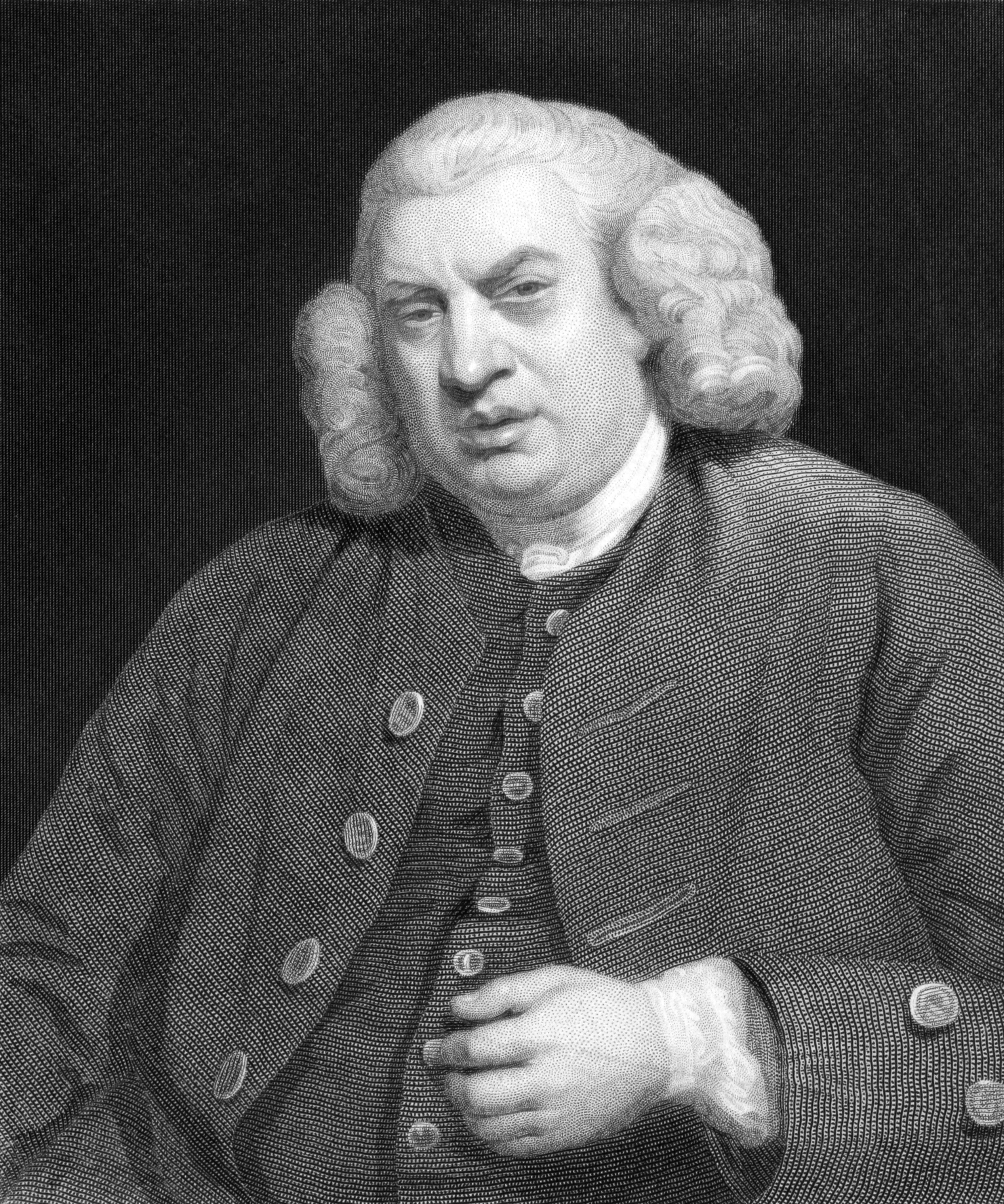Samuel Johnson frasi celebri
“Richardson aveva colto il nocciolo della vita… mentre Fielding si era accontentato del guscio.”
da Thraliana , a cura di Balderston, I, p. 555
riferendosi ai critici; citato in James Boswell, Vita di Samuel Johnson, 1754
citato in James Boswell, Vita di Samuel Johnson, 14 luglio 1763
“Ciò che è scritto senza sforzo è generalmente letto senza piacere.”
da Miscellanies
Johnson Miscellanies
Samuel Johnson Frasi e Citazioni
“Fielding è capace di descrivere un cavallo o un asino ma non ci è mai riuscito con un mulo.”
da Johnson Miscellanies, a cura di George Birkbeck Norman Hill, I, pp. 273-4
Origine: Citato in Ian Watt, Le origini del romanzo borghese (The Rise Of The Novel), traduzione di Luigi Del Grosso Destrieri, Bompiani, Milano, 1985.
“Le cifre tonde sono sempre false.”
citato in Apophthegms, Sentiments, Opinions and Occasional Reflections di Sir John Hawkins, in Johnsonian Miscellanies (1897), vol. II, pag. 2, edito da George Birkbeck Hill
Johnson Miscellanies
citato in James Boswell, Vita di Samuel Johnson, 30 aprile 1773
Origine: Citato in John Lukacs, Democrazia e populismo, traduzione di Giovanni Ferrara degli Uberti, Longanesi, 2006, p. 152.
citato in James Boswell, Vita di Samuel Johnson
Your manuscript is both good and original, but the part that is good is not original and the part that is original is not good.
[Citazione errata] Questa citazione viene spesso attribuita a Johnson ma non trova alcun riscontro nelle opere o nelle lettere dello scrittore, né tanto meno nelle biografie di Johnson scritte dai suoi contemporanei.
Attribuite
Origine: Samuel Johnson did not say: "Your manuscript is both good and original. But the part that is good is not original, and the part that is original is not good." http://www.samueljohnson.com/goodorig.html, Samuel Johnson.com.
“In quante poche case degli amici sceglierebbe di stare un uomo quando è ammalato!”
Origine: Citato in Boswell, Life of Johnson, IV.
Origine: Citato in Dizionario delle citazioni, a cura di Italo Sordi, BUR, 1992. ISBN 14603-X
“La natura ha dato alla donna un tale potere che la legge ha giustamente deciso di dargliene poco.”
Origine: Da Letters, I.
Origine: Citato in Dizionario delle citazioni, a cura di Italo Sordi, BUR, 1992. ISBN 14603-X
Samuel Johnson: Frasi in inglese
“Round numbers are always false.”
Quoted in the "Apophthegms, Sentiments, Opinions and Occasional Reflections" of Sir John Hawkins (1787-1789) in Johnsonian Miscellanies (1897), vol. II, p. 2, edited by George Birkbeck Hill
“Of all the Griefs that harrass the Distrest,
Sure the most bitter is a scornful Jest”
London: A Poem (1738) http://andromeda.rutgers.edu/~jlynch/Texts/london2.html, lines 166–167
“Words are men's daughters, but God's sons are things.”
Boulter's Monument. (Supposed to have been inserted by Dr. Johnson, 1745.)
Bartlett's Familiar Quotations, 10th ed. (1919)
Kearsley, 600
Bartlett's Familiar Quotations, 10th ed. (1919), Johnsoniana
“Abstinence is as easy to me as temperance would be difficult.”
Quoted in Anecdotes of Johnson by Hannah More in Johnsonian Miscellanies (1897), vol. II, p. 197, edited by George Birkbeck Hill. More had quoted this remark in a letter to her sister (April 1782)
Origine: The History of Rasselas, Prince of Abissinia (1759), Chapter 1
“I live in the crowd of jollity, not so much to enjoy company as to shun myself.”
Origine: The History of Rasselas, Prince of Abissinia (1759), Chapter 26
“Poetry is the art of uniting pleasure with truth, by calling imagination to the help of reason.”
The Life of Milton
Lives of the English Poets (1779–81)
March 31, 1778, p. 372
Life of Samuel Johnson (1791), Vol III
From Sir John Hawkins's Life of Johnson, Apothegms (1787)
In response to Hannah More wondering why Milton could write Paradise Lost but only poor sonnets. June 13, 1784, p. 542
Life of Samuel Johnson (1791), Vol IV
“All this [wealth] excludes but one evil,—poverty.”
1777
Bartlett's Familiar Quotations, 10th ed. (1919), Life of Johnson (Boswell)
July 14, 1763, p. 123
Life of Samuel Johnson (1791), Vol I
“A decent provision for the poor is the true test of civilization.”
1770, p. 182
Life of Samuel Johnson (1791), Vol II
“Attack is the reaction; I never think I have hit hard unless it rebounds.”
April 2, 1775
Life of Samuel Johnson (1791), Vol II
“In lapidary inscriptions a man is not upon oath.”
1775
Bartlett's Familiar Quotations, 10th ed. (1919), Life of Johnson (Boswell)
“A man may write at any time, if he will set himself doggedly.”
August 16, 1773
The Journal of a Tour to the Hebrides (1785)
August 15, 1773
The Journal of a Tour to the Hebrides (1785)
Stanza 9
Elegy on the Death of Mr. Robert Levet, A Practiser in Physic (1783)
Stanza 5
Elegy on the Death of Mr. Robert Levet, A Practiser in Physic (1783)
A Dictionary of the English Language (1755)
September 1, 1777
Life of Samuel Johnson (1791), Vol III
“Worth seeing? yes; but not worth going to see.”
October 12, 1779
On the Giant's Causeway. A similar opinion was expressed by the English traveller Richard Twiss in 1775 in A Tour of Ireland http://books.google.ie/books?id=ujpIAAAAMAAJ, p. 157
Life of Samuel Johnson (1791), Vol III
Letter to James Boswell, December 7, 1782, p. 494
Life of Samuel Johnson (1791), Vol IV
“Life is a progress from want to want, not from enjoyment to enjoyment.”
May 1776
Life of Samuel Johnson (1791), Vol III
July 28, 1763, p. 128
On Thomas Sheridan
Life of Samuel Johnson (1791), Vol I
Preface http://andromeda.rutgers.edu/~jlynch/Texts/preface.html
A Dictionary of the English Language (1755)
“A cow is a very good animal in the field; but we turn her out of a garden.”
April 14, 1772, p. 201
Life of Samuel Johnson (1791), Vol II
"The Bravery of the English Common Soldiers" http://books.google.co.uk/books?id=5L9GAAAAcAAJ&pg=PA306&dq=%22Liberty+is%22&hl=pt-PT&sa=X&ei=QMMqU_f7MMPMhAeAwoC4DA&redir_esc=y#v=onepage&q=%22Liberty%20is%22&f=false. Note: This essay was "added to some editions of The Idler, when collected into volumes, but not by Dr. Johnson" — vide The Works of Samuel Johnson, Vol. 2 (London, 1806), footnote http://books.google.co.uk/books?id=uYPfXTOfTTsC&pg=PA427&dq=%22This+short+paper%22&hl=pt-PT&sa=X&ei=DcgqU_PlN_Ha0QXQyoDoAw&ved=0CGIQ6AEwBjgU#v=onepage&q=%22This%20short%20paper%22&f=false on p. 427
